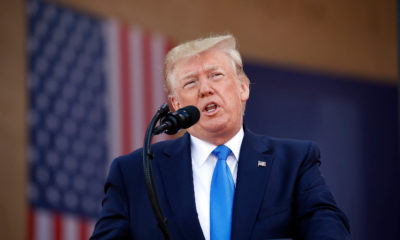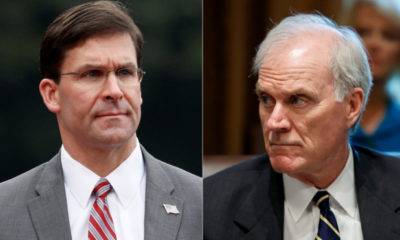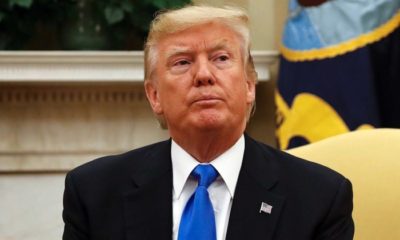World
Clinton unfit to be President, says Trump
 Washington : Republican presidential candidate Donald Trump said that the disdain his Democratic rival, Hillary Clinton, showed for voters by calling his supporters “deplorables” made her unfit to occupy the White House.
Washington : Republican presidential candidate Donald Trump said that the disdain his Democratic rival, Hillary Clinton, showed for voters by calling his supporters “deplorables” made her unfit to occupy the White House.
“You cannot run for President if you have such contempt in your heart for the American voter. You can’t lead this nation if you have such a low opinion of its citizens,” Trump said on Monday in a speech to the National Guard Association conference in Baltimore.
Trump once again attacked Clinton for having remarked on Friday that “half” of his supporters belong in a “basket of deplorables”, given that – she said – they harbour racist, misogynist, homophobic, xenophobic and/or Islamophobic sentiments.
Clinton said she was being “grossly generalistic”, adding that the other half of Trump’s supporters are frustrated and need sympathy.
Trump focused his Baltimore speech on attacking those comments, but he did not delve into the circumstances that led the former secretary of state to fall ill on Sunday and leave a ceremony at Ground Zero in New York City to honour the victims of the September 11, 2001, terror attacks.
Clinton’s campaign and her doctor issued statements saying that the candidate had become dehydrated and overheated at the ceremony because she was suffering from pneumonia, as had been diagnosed on Friday.
On the contrary, Trump elected to attack his opponent on her “deplorables” comment, saying that Clinton’s remarks were targeted at law enforcement personnel and the military, adding that “These were the people Hillary Clinton so viciously demonised” and demanding that she issue a full apology.
“She divides people into baskets as though they were objects not human beings,” he declared.
Trump, who is behind Clinton in the voter surveys but has narrowed her lead, wants to win the votes of the rural middle class who have lost ground economically due to globalisation and industrial reconversion.
Nevertheless, Trump will have great difficulty winning the presidency with just that voter segment, and desperately needs the support – only marginal to date – of Hispanics and African Americans.
World
Lockdowns in China Force Urban Communities to Defy Censorship and Vent Frustration Online

Shanghai’s rich middle class is leading a wave of online dissent over the strict and prolonged lockdowns imposed in various parts of the country. Chinese internet censorship is struggling as patience is wearing thin in many urban centers, coming up with creative forms of online protests.
Social Media Posts Revealing Lockdown Tension in Shanghai
Drawn-out lockdowns are nothing new in China as authorities insist with the nation’s zero-Covid policy since the start of the pandemic. Currently over This time around, however, metropolitan areas like Shanghai are increasingly difficult to keep quiet, given that its more than 25 million residents have seen weeks of total isolation along with food shortages and many other service interruptions.
Dozens of towns and reportedly over 300 million Chinese citizens have been affected by lockdowns of different severity. As expected, urban netizens have been most outspoken over their difficulties by finding creative ways to get around state censorship and bans placed on topics, news comments and spontaneous campaigns.
Shanghai residents have been using mobile proxies and hijacking seemingly unrelated hashtags to talk about healthcare issues, delivery failures and the overall severity of their situation. The “positive energy” that the Chinese government wants to transmit during the recent prolonged series of lockdowns does not come naturally to those counting food supplies and online censors are working hard to filter words, trending topics and undesired social media sharing.
WeChat groups and message threads are under constant monitoring. Posts questioning the zero-Covid approach have been quickly deleted, including by leading Chinese health experts like Dr. Zhong Nanshan. Video footage is soon censored and protests and investigations are quickly made to disappear.
Where this has not worked, officials have exposed banners with warnings and outright threats like “watch your own mouth or face punishment”, while drones have been patrolling the city skies. Yet, if anything, this has led to further tensions and unspoken confrontation with Shanghai’s educated and affluent middle class.
Creative Online Solutions Harnessing Civic Energy
Announcements by Chinese social media that they would be publishing the IP addresses of users who “spread rumors” have not helped either. Tech industry research has shown that much of Asia’s tech-savvy population has a habit of using mobile proxies and other privacy tools, quickly finding workarounds to browse the internet freely and talk to the world about the hottest topics.
The sheer volume of forbidden posts is already a challenge for the very censorship system, experts explain. Unable to track all trending hashtags, state workers overlook topics that speak about the US, Ukraine or other popular news. Linking human rights elsewhere to their situation, Chinese online dissidents establish their informal channels and “hijack” the conversation to share personal or publicly relevant information about the Covid suppression in their town.
Sarcastic and satirical posts still dominate. Others hope to evade the censors by replacing words from famous poems or the national anthem. One thing is certain – social media, when harnessed with the right creativity, has proven its ability to mount pressure on the government in even some of the most strictly controlled tech environments like China.























